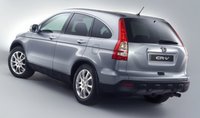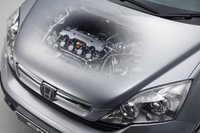Honda Motor Europe Ltd. today announced the all-new, third generation CR-V, successor to a range that has achieved just under 2.5 million sales worldwide over the past 11 years. The latest CR-V continues to offer SUV practicality but with more car-like driving dynamics and styling, greater comfort and a more luxurious interior, reflecting growing customer demand for quality and premium products in the compact SUV market.
Generous equipment levels are matched by cutting edge technology including two systems that are unique to the segment: Adaptive Cruise Control (ACC), the radar-controlled cruise control function which maintains a set distance to a vehicle in front, and Collision Mitigation Brake System (CMBS), which initiates a series of warnings to the driver if the distance to the vehicle in front decreases beyond an acceptable level, before applying strong braking and retracting the front seatbelts if the situation becomes critical. Both these systems are optional depending on grade.
The sportier styling is characterised by a ‘cab-forward’ look and a coupe-like tapering side window profile, reflecting the enhanced vehicle dynamics. The frontal styling is also much bolder with a prominent bonnet, distinctive double grille flanked by projector-style headlamps and a large bumper. Muscular lower proportions, a wide track and standard 17 inch wheels emphasise the CR-V’s SUV credentials. At the rear, the vertically opening tailgate’s rounded glass and a sculptured lower panel add further distinction. The spare wheel is now located beneath the load compartment floor.
A full complement of passive safety measures includes dual stage SRS front airbags, side airbags for front seat passengers, full length curtain airbags, and front and rear seatbelt reminders, all fitted as standard, with active front headrests on most grades.
The new CR-V also incorporates Trailer Stability Assist (TSA) which together with Vehicle Stability Assist (VSA) ensures that towing safety is continuously monitored and corrected. In addition, towing capacity on petrol manual models rises from 1500 to 1600 kg; on the diesel engined CR-V it is increased from 1500 kg to a very competitive 2000 kg.
Active Front Lighting (AFS), a system whereby the driver’s view of the road ahead is enhanced by the low beam headlamps turning in the direction the vehicle is turning, is also available on the CR-V for the first time.
In common with other recent Hondas, the CR-V features Advanced Compatibility Engineering (ACE) body structure technology for excellent crash safety characteristics. A polygonal frontal structure reduces the potential for vehicle to vehicle misalignment and upper and lower energy absorbing pathways optimise energy distribution. High tensile steel now makes up 58 per cent of the monocoque body. Honda anticipates a Euro NCAP 5-star rating for occupant protection, 4-stars for child protection and a 3-star pedestrian rating.
Interior accommodation remains generous and the dimensions are generally the same as for the previous CR-V, although the load space is effectively extended backwards to take up the space vacated by the former tailgate-mounted spare wheel. Passengers enjoy the same ‘command view’, while access has been improved by larger doors that open wider and lower sills.
The new, premium interior features metallic trim elements applied to fascia and doors contrasting with soft textured black trim. Front seats are larger and more comfortable and the steering column is adjustable for reach as well as rake. Relocation of the gear lever to the base of the centre stack brings it closer to the steering wheel and frees up floor space.
The availability (depending on grade) of a driver’s 8-way adjustable power seat, leather upholstery, 18 inch alloy wheels, front and rear parking sensors and a rear view camera are an indication of the CR-V’s more upmarket specification.
Like the Civic, the CR-V offers the option of a Panorama glass roof which stretches from the windscreen to a point above the rear seat to provide an even lighter cabin. If desired, it can be closed off by two electric blinds which are covered in the same material as the roof lining.
Rear seats – the base is split 60:40, the seat back 40:20:40 – can be slid to maximise leg room or luggage space, can be reclined for added comfort, and the centre section can be folded flat to enable longer items to be carried while still accommodating two rear seat passengers. With the seats tumbled forward and stored upright a capacious load area is opened up, sufficient to accommodate two mountain bikes with their front wheels still in place.
Added flexibility is provided by the novel Double Deck luggage area, formed by a substantial shelf which sits at a height of 330 mm above the load floor – sufficient to allow a standard stroller to be stowed beneath it. It means luggage can be subdivided, with that on the lower level more easily accessible; the shelf is also hinged across its width for added convenience. When not in use, the shelf can either be removed or stored snugly in a recess in the floor.
Power is provided by a 2.0-litre petrol or a 2.2 diesel engine. Honda’s advanced 140 PS 2.2-litre i-CTDi diesel continues unchanged; but with the new CR-V’s aerodynamic efficiency improved by 12 per cent, fuel economy is even better.
The petrol engine is an all-new unit based on the 1.8-litre SOHC i-VTEC of the Civic range. That means in addition to the very latest VTEC and friction reduction technologies; it also features a further innovation: delayed closure of the intake valves combined with a wide open throttle valve during low-load driving conditions to reduce pumping losses and boost fuel economy.
Petrol engine models are also equipped with brand new transmissions: either a 6-speed manual or an optional 5-speed automatic.
Maximum power and torque figures are 110 kW/150 PS at a slightly lower 6,200 rpm, and 190 Nm at 4,200 rpm – and the engine’s greater efficiency together with the improved body aerodynamics and the new gearboxes boost fuel economy. Performance is also enhanced, with the 0 to 100 km/h time dropping from to 10.2 seconds (manual) and from 13.1 to 12.2 seconds (automatic).
The Real Time 4WD system combines a quiet, fuel-efficient, dual-pump system with a one-way cam unit to significantly enhance sensing of front-wheel slippage – all in a lightweight, compact design. The system transfers power - 20% more torque compared to existing unit - to the rear wheels promptly, and significantly improves stability during startup and cornering on snow-covered roads and other slippery road surfaces.
The new CR-V’s handling characteristics are now more car-like in their character. Key changes include a centre of gravity lowered by 35 mm, a track that is wider by 30 mm, and larger 17 inch wheels, together with a number of changes to the steering and suspension geometry. Crisper responses to driver input, more directional stability and greater all-round agility are the result.
The new CR-V will receive its international show debut in during September and sales begin in January 2007.
Gallery: (click on photos for larger images)








No comments:
Post a Comment